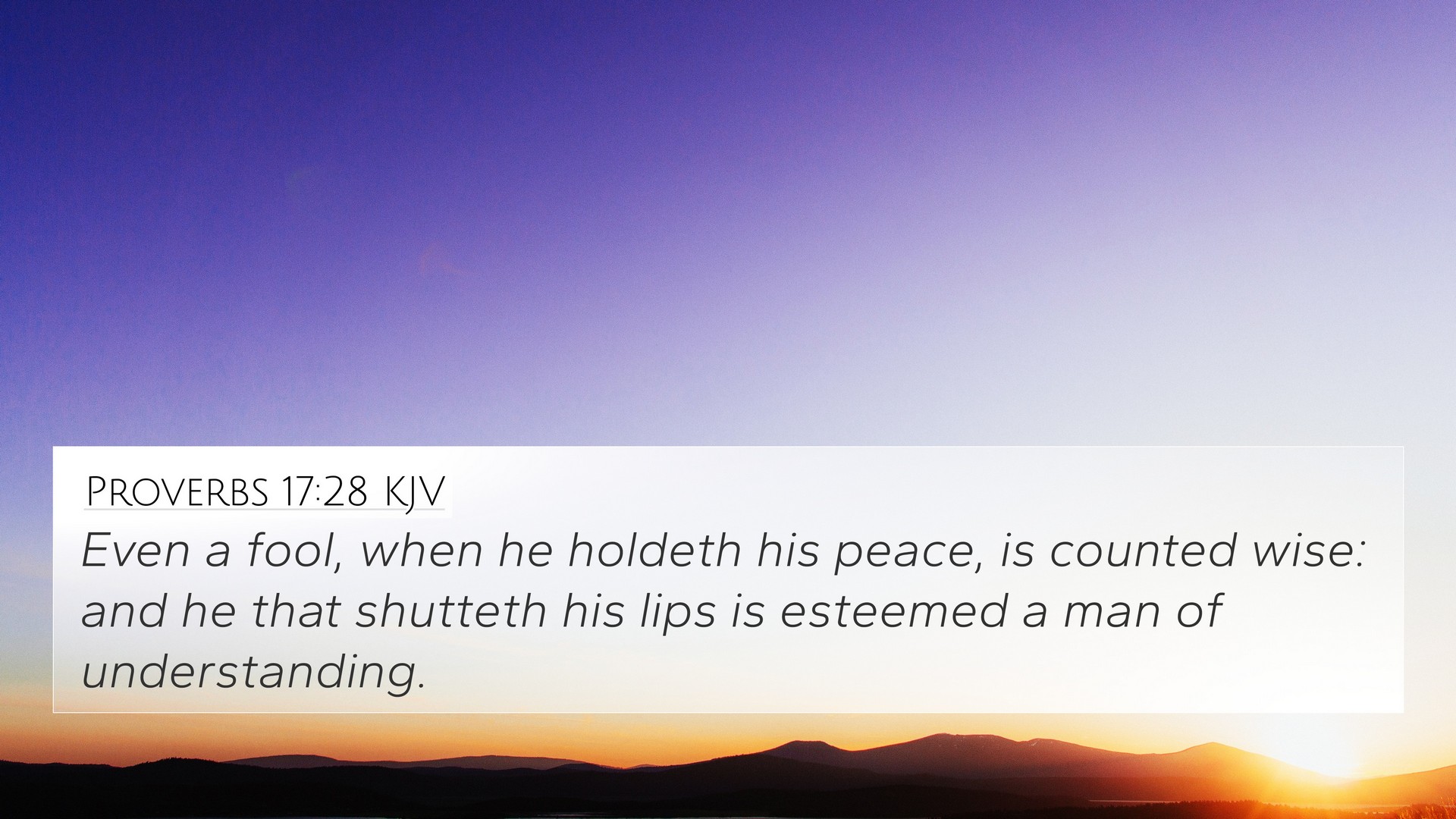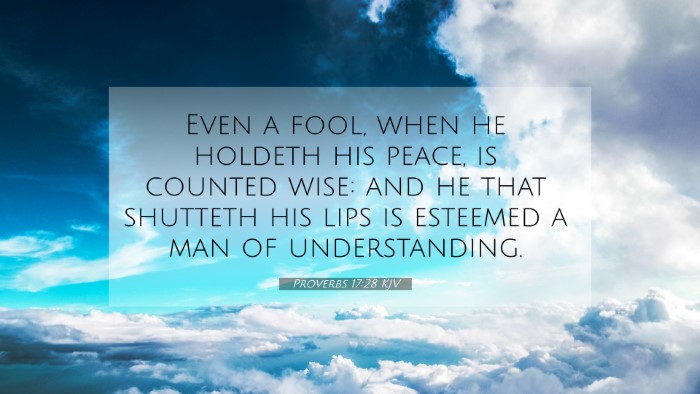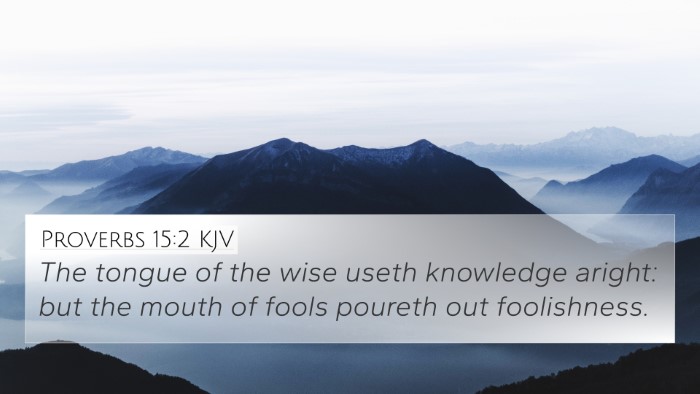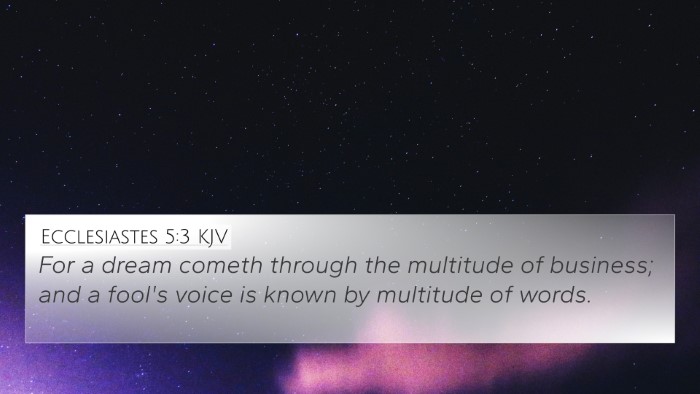Understanding Proverbs 17:28
Proverbs 17:28 states, "Even a fool, when he holdeth his peace, is counted wise: and he that shutteth his lips is esteemed a man of understanding."
This verse highlights the importance of silence and its role in displaying wisdom. In a world where words are plentiful, the ability to refrain from speaking often marks a person as insightful.
Meaning and Interpretation
The wisdom illustrated in this proverb notes that sometimes the best response is no response at all. In many public commentaries, the following insights are provided:
-
Matthew Henry: Henry emphasizes the virtue of silence, suggesting that it often allows a person to avoid foolish commentary and enables deeper reflection. A fool's silence can lead to an impression of wisdom, indicating a cautious approach to communication.
-
Albert Barnes: Barnes elaborates on the potential of silence in preserving one's reputation. He underscores that by choosing to remain silent, a person can avoid the pitfalls of foolish remarks that can tarnish their standing in the eyes of others.
-
Adam Clarke: Clarke stresses that silence may reflect a more profound understanding of situations. He argues that knowing when to speak and when to remain quiet is a hallmark of true wisdom.
Cross References
Proverbs 17:28 connects to several other verses in the Bible that further elucidate its themes of wisdom, silence, and understanding. Notably:
- Proverbs 10:19 - "In the multitude of words there wanteth not sin: but he that refraineth his lips is wise."
- Proverbs 11:12 - "He that is void of wisdom despiseth his neighbor: but a man of understanding holdeth his peace."
- James 1:19 - "Wherefore, my beloved brethren, let every man be swift to hear, slow to speak, slow to wrath."
- Proverbs 18:13 - "He that answereth a matter before he heareth it, it is folly and shame unto him."
- Ecclesiastes 3:7 - "A time to rend, and a time to sew; a time to keep silence, and a time to speak."
- Proverbs 21:23 - "Whoso keepeth his mouth and his tongue keepeth his soul from troubles."
- Proverbs 29:11 - "A fool uttereth all his mind: but a wise man keepeth it in till afterwards."
Thematic Connections and Insights
The themes presented in Proverbs 17:28 can be connected to broader concepts found throughout scripture, particularly regarding the wisdom of restraint and the power of words. These connections reveal a narrative that emphasizes the importance of discernment both in speech and action.
Connections Between Bible Verses
The connections between Bible verses reveal significant insights:
-
Linking Bible Scriptures: The relationship between Proverbs 17:28 and James 1:19 emphasizes the universal principle that listening is often more valuable than speaking.
-
Comparative Bible Verse Analysis: Exploring Proverbs 10:19 alongside Proverbs 17:28 deepens the understanding of how silence can be seen as wisdom, while excessive talking often leads to sin.
-
Thematic Bible Verse Connections: The common theme of restraint found in Proverbs and echoed in James illustrates a consistent biblical principle that values understanding over impulsive reaction.
Practical Applications
To apply the lessons from Proverbs 17:28 in modern life:
- Practice active listening and allow others to express their thoughts before providing your input.
- Consider the potential impact of your words before speaking, particularly in sensitive conversations.
- Utilize moments of silence for contemplation, enabling deeper understanding of situations.
- Engage in self-reflection about the nature of conversations in which you participate, aiming to contribute positively.
Tools for Bible Cross-Referencing
For those interested in exploring cross-references further:
- Bible Concordance: Use a concordance to find related verses connected to themes of wisdom and silence.
- Bible Cross-Reference Guide: Many study Bibles provide insightful cross-references to similar concepts and themes throughout scripture.
- Cros-Referencing Bible Study Methods: Engaging in group Bible studies focused on linked verses can enhance understanding of biblical principles.
Conclusion
Proverbs 17:28 offers a profound insight into the nature of wisdom as represented through silence. By examining this verse alongside others, we can appreciate the interconnectedness of biblical teachings and their relevance in our daily lives. Understanding the value of thoughtful restraint enriches our communication and relationships, embodying the wisdom that connects us through scripture.







